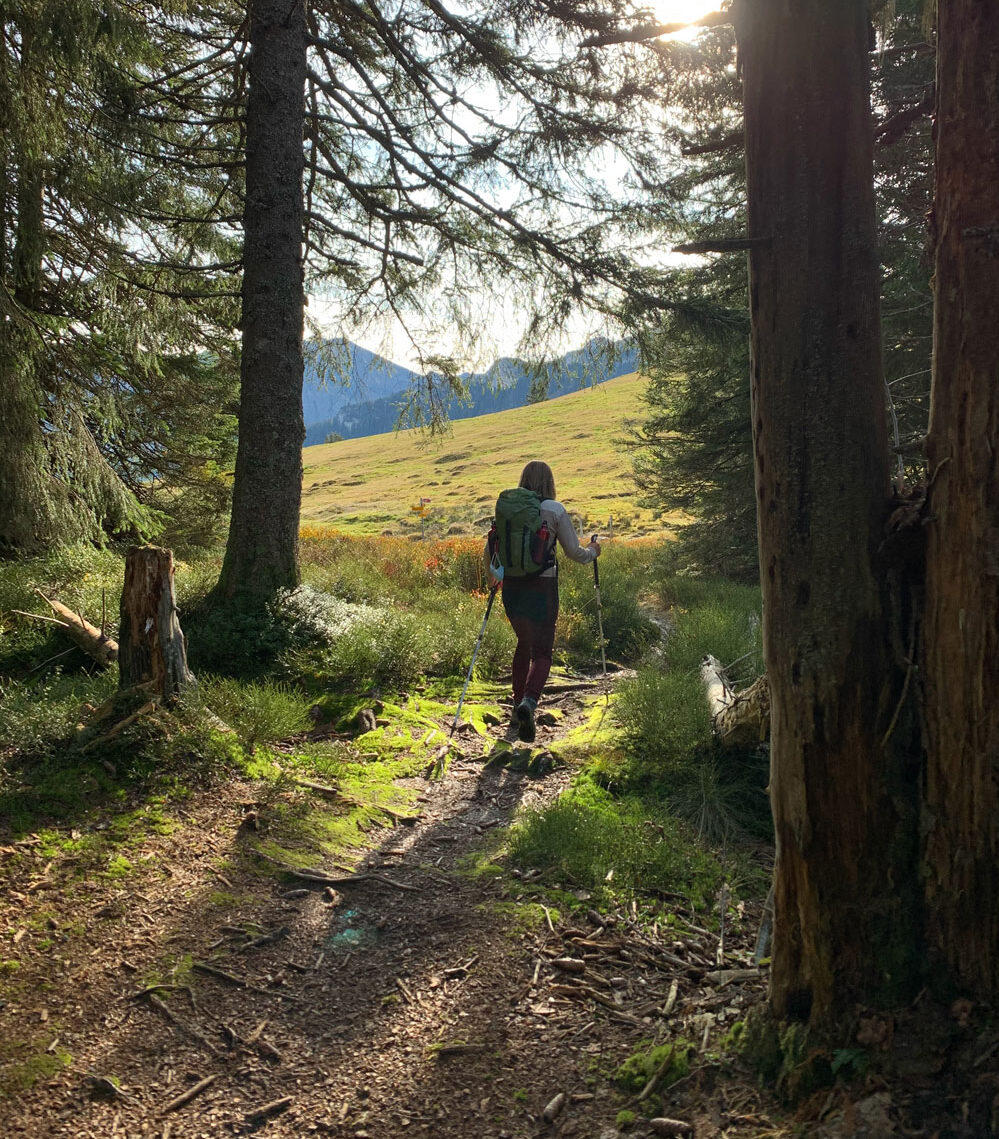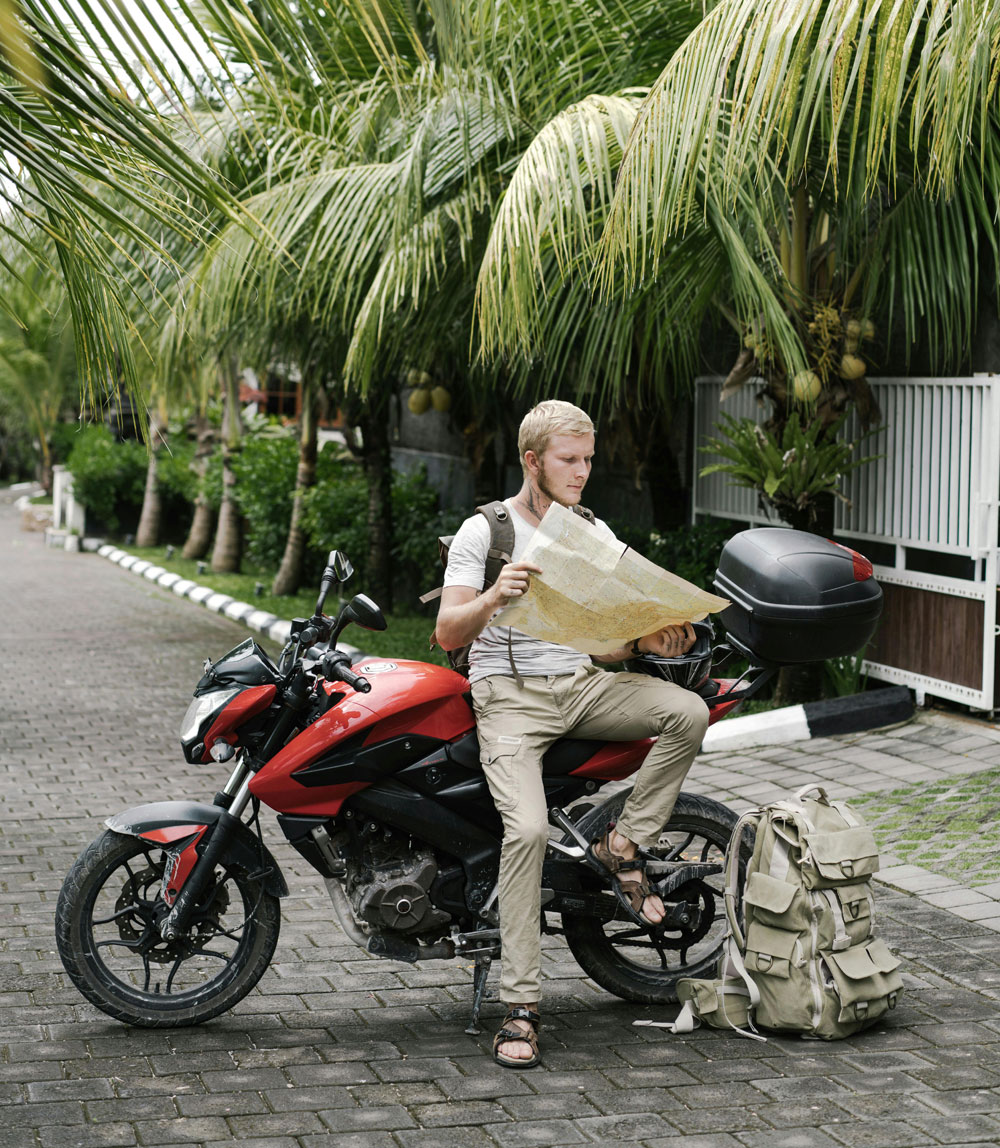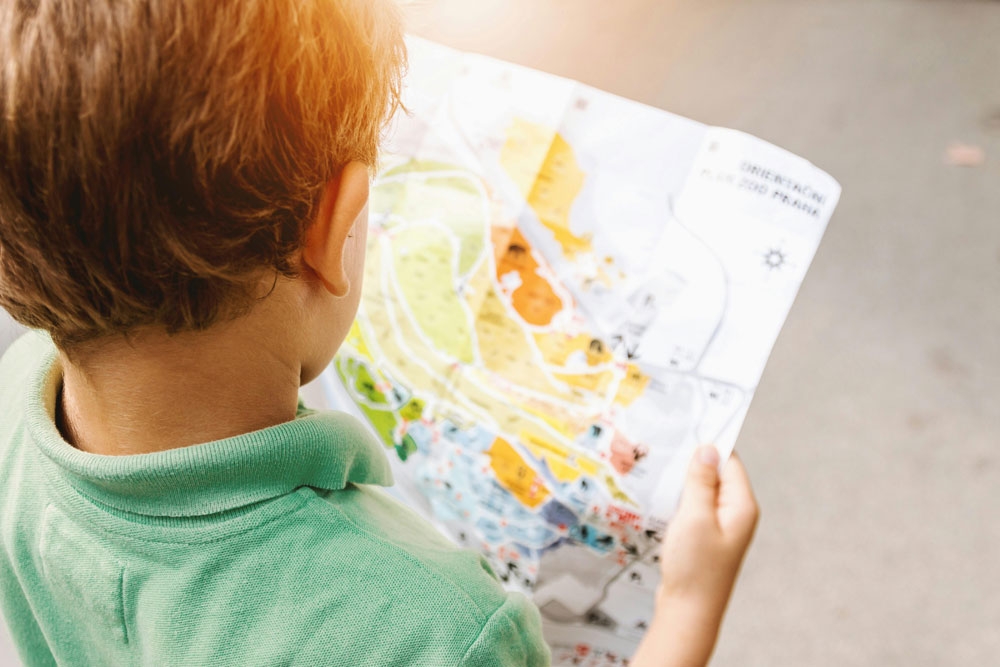
There was a stretch in my early childhood where my parents struggled with how to schedule my summers. I wasn’t a girl scout, wasn’t sporty (although my mother and I always said we were training for the cuddle-lympics), and my family’s favorite activity was watching old movies. Luckily I found a theater camp I loved and scored well enough on standardized tests to go to super nerd camp, because traditional sleepaway camp just wasn’t my thing. Now researchers are saying that my growing up not having frolicked and forayed outdoors as a kid has likely hindered the development of my sense of direction. To which I say to these researchers, tell me about it! Knowable Magazine just reported on results gathered globally, and all roads lead to experience counting more than “innate ability” when it comes to being a good navigator. A few highlights:
Making a game of it: A remarkable, large-scale experiment led by Hugo Spiers, a cognitive neuroscientist at University College London, gave researchers a glimpse at how experience and other cultural factors might influence wayfinding skills. Spiers and his colleagues … developed a game for cellphones and tablets, Sea Hero Quest, in which players navigate by boat through a virtual environment to locate a series of checkpoints. The game app asked participants to provide basic demographic data, and nearly 4 million worldwide did so. … Through the app, the researchers were able to measure wayfinding ability by the total distance each player traveled to reach all the checkpoints. … Then Spiers and his colleagues could compare players’ performance to the demographic data.
A matter of culture: Several cultural factors were associated with wayfinding skills, they found. People from Nordic countries tended to be slightly better navigators, perhaps because the sport of orienteering, which combines cross-country running and navigation, is popular in those countries. Country folk did better, on average, than people from cities. And among city-dwellers, those from cities with more chaotic street networks such as those in the older parts of European cities did better than those from cities like Chicago, where the streets form a regular grid, perhaps because residents of grid cities don’t need to build such complex mental maps.
Another win for gender equality: Results like these suggest that an individual’s life experience may be one of the biggest determinants of how well they navigate. Indeed, experience may even underlie one of the most consistent findings — and cliches — in navigation: that men tend to perform better than women. Turns out this gender gap is more a question of culture and experience than of innate ability. Nordic countries, for example, where gender equality is greatest, show almost no gender difference in navigation. In contrast, men far outperform women in places where women face cultural restrictions on exploring their environment on their own, such as Middle Eastern countries.
Skills that make good navigators: These include the ability to estimate how far you’ve traveled, to read and remember maps (both printed and mental), to learn routes based on a sequence of landmarks and to understand where points are relative to one another. Much of the research, though, has focused on two specific subskills: route-following by using landmarks — for example, turn left at the gas station, then go three blocks and turn right just past the red house — and what’s often termed “survey knowledge,” the ability to build and consult a mental map of a place.
Mixing methods is best: Not surprisingly, better navigators may also be better at switching modes and choosing the most appropriate navigational strategy for the situation they find themselves in, says cognitive neuroscientist [Steven] Weisberg, now at the University of Florida. This could mean using landmarks when they are obvious and mental maps when more sophisticated calculations are needed. “I’ve moved toward thinking that our better navigators are also using a lot of alternate strategies,” Weisberg says. “And they’re doing so in a much more flexible way that affords different kinds of navigation, so that when they find themselves in a new situation, they’re better able to find their way.”
So scientific results show that the more you do something, the better you get at it. What a concept! But I’m gonna be glass half-full about this and say that what I didn’t learn in practical navigation in my youth, I’ve made up for in spades when it comes to navigating theatrical story structure. And that has to count for something! I also have to say that it kind of warms my heart that researchers are diving into this topic in the age of smartphones. Which brings me to what I didn’t excerpt above, the way the article ends by addressing the big GPS elephant in the room. Not surprisingly, GPS usage makes even the best of navigators lose some of their skillset. So as long as we have a network and power, anyone can get around. Short of those tools, look out for landmarks, build up a mental map, and always take that left turn at Albuquerque.
Photos credit: Stéphane Fellay on Unsplash, Third Man, Arthouse Studios and JES Shoots on Pexels














I have a HOLE in my head where maps and orientation should be.
Yeah, I never got any tips or tricks or anything so I have no idea…….
And I have a mirror memory too LOL
I call BS. My otherwise brilliant sister has absolutely no sense of orientation at all. She can get turned around so easily and maps just don’t make intuitive sense to her, and my mom is the same way. I’m sure practice helps as with everything but there is definitely a genetic component for many people.
I also call BS. I was your classic nerd kid with my nose stuck in books (not a girl scout and rarely exploring outside, but I have a great sense of direction in new and old places.
Same. This seems reductive. There are several components to navigation besides just “practice more” 🙄
I have zero spatial awareness or sense of direction in real life but I’m excellent at diagrams and maps. It’s the difference between being a rat in a maze (former) and having a bird’s eye view of the maze (latter). I can’t see past what I can see if I’m navigating IN a new environment but I can rotate those IKEA instructions in my head to build the thing.
It’s also a matter of paying attention – a route I’ve taken a million times as a passenger will never register (bc why? I trust the driver) but if it’s been my responsibility I will be paying attention and remember.
I was a Brownie and we did things like this but while I’m not bad at finding my way around places, I have always had issues judging distances i.e. that place is XX yards/meters from the station – I tend to judge distances in time i.e. its about a 5 min walk north from the station. Maybe am weird like that.
Am also pretty sh!t at reading a map.
I can relate to everything you wrote, Digital Unicorn. My husband works with kilometers and I go by time “distance.”
Anecdotally, the people in my family with dyslexic tendencies are best at navigating.
I hate when my car’s GPS tells me “turn right in 500 feet ” WTH is 1000 feet? Just say “turn right at the light” or “turn left at the second street”!
I am 10000% directionally challenged. I was born breech, so I couldn’t even make my way out of the birth canal correctly lol. Yet, like I always tell everyone, no matter how lost I’ve ever gotten, here I am, I’ve still somehow managed to find my way back home!
Please. My mom has been driving for 60+ years and has lived in the same area for decades at a time, and is still a tourist in her own home. I have her sense of direction too.
I grew up outside, every day, girl scouts, sports and I am HORRIBLE when it comes to me directions. We roamed the creek and walked every where.
I’m confused. Is the game solely on-line or does it involve navigating in the real world? Either way how do they know that the people only get so far because of skills when it could also indicate not being as into the game as other players?
Right? I have a very good sense of direction, though GPS has weakened my skills. I have no idea whether I’d be good at this game. I’d really like to know what the game looks like, and why they think navigating the game world demonstrates skill at navigating the 3D world.
For one thing, real-world navigation/hiking/orienteering involves lots of cues (lighting, sounds, smells, elevation, incline, snow/moisture/vegetation patterns) that can’t easily be replicated in a video game on screen.
Also, in the real world, whether we’re driving, on a trail, or bushwhacking, the best/fastest/safest route isn’t always the “shortest distance traveled”, which seems to be the game’s measure of success?
I have a pretty decent sense of direction, but only if I’ve been paying attention, which I never do in vacation-like settings, and then I get lost. Cities that don’t have grid systems are very confusing to me
Well, I was a total tomboy as a kid, out in the woods and lakes and fields around our house from dusk to dawn, hiking and walking and biking, and I have no sense of direction. I navigate by landmarks.
My husband, meanwhile, who grew up with his nose in a book or glued to a movie screen, is the opposite. Always oriented. Glances at a map and he’s good. I think natural ability also plays a part.
Lol I meant from dawn to dusk.
LOL, I was impressed by your being able to navigate all of those things in the dark! I too navigate better by landmarks. But if those landmarks change, well….I’ll probably be late lol
I definitely thought the headline was referring to metaphorical direction, and my immediate reaction was “Tell me about it…”
Incidentally, my real-world sense of direction is amazing. But navigating my interests, life goals, and making decisions is an absolute head-scratcher for me.
I thought so too!
My sense of direction is decidedly not great. OTOH, I remember marveling at the toddler son of a friend who — from his car seat — would say things like “that’s where aunt Blithe lives” as his mom was driving on a stretch of highway with zero landmarks that were discernible to me. So, while practicing helps, and while learning how to recognize and use cues helps, there’s likely a significant variation in having a propensity for this set of skills.
My son is like this too! At less than two years old, riding backwards in a car seat and in the back seat, he knew where he was and could remember places we’d driven by months earlier. Now he’s seven and knows the name of every major street in our metropolitan area. He loves being up high (mountainside, tall buildings) and looking down at landmarks. It was interesting to read about the study, but I truly believe this ability is neurological and innate – some people’s minds work this way naturally, and some don’t.
My husband could be plunked down in a strange environment and easily find his way out of it. To me it’s a lot like having artistic ability, or having an “ear” for languages…you’ve either got it or you don’t. I don’t.
Idk, I’m not sure an “ear” for languages is a thing? Every neurotypical child (and most kids who aren’t neurotypical) gains fluency in the languages spoken around them by the time they’re about three. You did, too. If the people around you had consistently spoken two or more languages to you as a child, you would have learned them all.
I tend to think learning new languages is a skill—if you’ve grown up knowing more than one, it’s easier to learn more of them because you know how to learn languages, iyswim.
But people who reach adulthood monolingual, ime, have a harder time wrapping their heads around the fact that other languages have their own grammar, syntax, and, well, map of the world, iyswim.
I have a great sense of direction and distance – probably because on family trips my father made me the “navigator” and I spent a lot of time with atlases on my lap – and I minored in Geography for awhile because I love maps so much. My husband, on the other hand, can’t remember what direction we were traveling in if we pull off the road to use a bank or get coffee. He has no mental map – but if you ask him how long a wall is or how big a room, he’s got that skill from being an electrician for 30 years.
Growing up we had a bird pen that had 3 wire sides and a solid north wall. Any time I need to orient direction I close my eyes, picture the bird pen, and turn to face the north wall. Works every time.
I can’t tell left from right. I have to look at my hands and pretend to write to remember which way is right. And I spent five years in the marching band in high school. I can, however, pretty reliably find my way back to somewhere I’ve been before. Can’t give you directions, but I can get there. Went on a cruise with friends. I was the one who could navigate through the ship, along the various corridors and up and down staircases. That said, I was a free range 70s kid. There was something recently about how far from home kids are allowed to go these days. Looking at a map, I realized we often rode bikes to a park 12 miles away for the day.
One thing about studies like this is they are measuring variation, not saying people who only read books as kids can’t navigate IRL. It’s what does it mean that 39% of Americans, 46% of Scandinavians, and 31% of people in the Middle East are good navigators. Whether you can read maps and find your way or not only counts as a data point. They are looking at overall proportions of the entire population and what that could mean.
My father was a trucker for thirty years before he retired and he’s always been a bit disapointed that neither my sister nor myself were able to find our way around as well as he does (my mother is quite terrible at it too).
The day before I was to take the exam for my driver’s license the instructor told my dad that I would never get it until I learned how to properly read signs to actually know where I’m supposed to go next. I got my driver’s license on the first try but I still have a terrible sense of direction.
my sense of direction is abysmal. The mountains are north. If I can’t see the mountains, I’m lost.
My son, though. Totally different. When he was 6, we went to meet up w/his father’s family in the U.S. on roads I’d never driven before and the U.S. drives faster than we do. So I was a nervous wreck. My son picked up the map I kept pulling off the road to check (long before GPS), put his tiny finger on the map and said we need to take the next exit and turn back cause we’re going the wrong way. I pulled off the road, went to a gas station and DAMN the boy was right. At 6, he was a better navigator than I ever was or ever will be. It’s one of my favourite ‘when you were a boy’ stories!
I grew up outdoors and always had a great sense of direction. When I moved to a big city I didn’t have any problems navigating, became familiar very quickly. Until I go underground. I totally get turned around and lost in the subway.
And I miss paper maps. As a kid I loved “reading” them. I would stare at them for hours planning trips. And I got good a folding them. At my first job my boss had a huge file cabinet filled with improperly folded maps. It was a mess. I took the time to fold them properly and he was so happy he gave me a bonus. LOL
I beg to differ. I call it “directional dyslexia” and nobody can convince me that I don’t have it.
I call it “directionally challenged”, and I 💯 have it.
I’m Gen X, born the first year of it (or last of the Boomers, 1965, so on the cusp). People my age like to say we grew up sort of “feral.” We were outside as much as weather permitted and sometimes when it didn’t, playing with neighbors, climbing trees, playing games. We rode our bikes all over town, got ourselves to school and back and to other appointments a lot of the time. I also went to riding camp for a few years, where one of the goals for the final week was to do trail rides with jumps alone and find our way back to base.
I have a very good sense of direction. If I’m in an unfamiliar place or city I can get turned around, especially if it’s crowded which can throw me off my game. But I almost always have a feel for which way is North, whether I’m headed the right way, where I remember a landmark of any kind being. I guess my upbringing explains that.
I slightly disagree with this. As adults, of course people who do things that use a sense of direction more tend to be better at it. That’s neuroplasticity at work. But I believe there are people who have an innate sense of direction as a child. My mom often tells a story about how when I was 3, almost 4, she took me into downtown Dallas for something, and when we left, she got completely turned around and mixed up in the parking garage. She was panicking, and I took a look around, told her to follow me, and led her – down a floor and across the entire garage – directly to the car. I don’t see how that could be learned at 3 years old. I don’t quite remember that particular occasion, but there were a lot of similar ones throughout my childhood and teenage years.
Now I’m not quite that good anymore. I don’t do things that require that sense very often, so as I get older, it takes me longer to figure a place out, and that would probably show in their study.